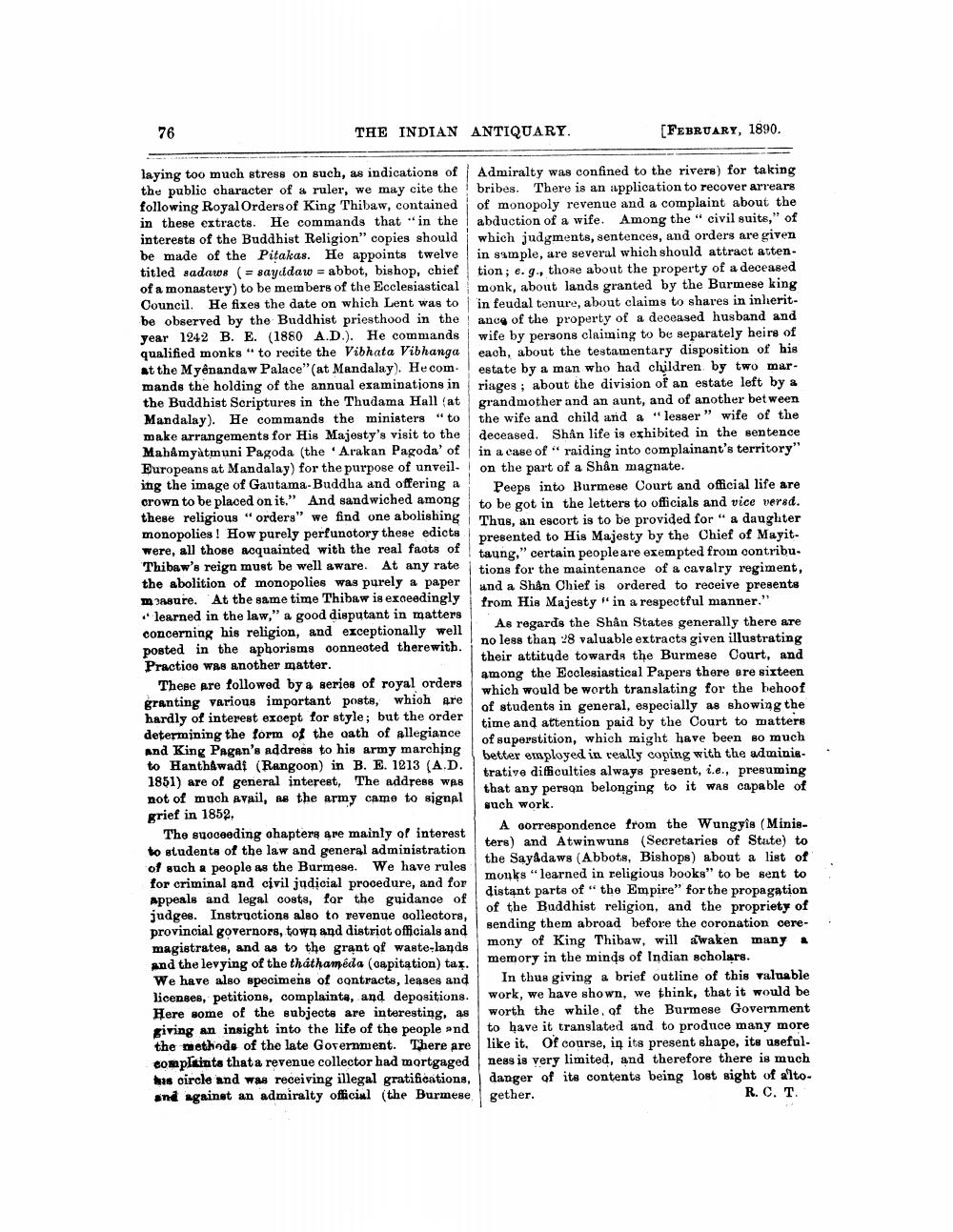________________
76
THE INDIAN ANTIQUARY.
[FEBRUARY, 1890.
laying too much stress on such, as indications of Admiralty was confined to the rivers) for taking the public character of a ruler, we may cite the bribes. There is an application to recover arrears following Royal Orders of King Thibaw, contained of monopoly revenue and a complaint about the in these extracts. He commands that in the abduction of a wife. Among the " civil suits," of interests of the Buddhist Religion" copies should which judgments, sentences, and orders are given be made of the Pitakas. He appoints twelve in sample, are several which should attract attentitled sadaws (= say daw = abbot, bishop, chief tion; e.g., those about the property of a deceased of a monastery) to be members of the Ecclesiastical monk, about lands granted by the Burmese king Council. He fixes the date on which Lent was to in feudal tonure, about claims to shares in inheritbe observed by the Buddhist priesthood in the ance of the property of a deceased husband and year 1242 B. E. (1880 A.D.). He commands wife by persons claiming to be separately heire of qualified monks to recite the Vibhata Vibhanga each, about the testamentary disposition of his at the Myênandaw Palace" at Mandalay). Hecom. estate by a man who had chuldren by two mar. mands the holding of the annual examinations in riages ; about the division of an estate left by a the Buddhist Scriptures in the Thudama Hall (at grandmother and an aunt, and of another between Mandalay). He commands the ministers "to the wife and child and a "lesser" wife of the make arrangements for His Majesty's visit to the deceased. Shân life is exhibited in the sentence MahAmyàtmuni Pagoda (the Arakan Pagoda' of in a case of " raiding into complainant's territory Europeans at Mandalay) for the purpose of unveil on the part of a Shån magnate ing the image of Gautama Buddha and offering a Peeps into Burmese Court and official life are crown to be placed on it." And sandwiched among
to be got in the letters to officials and vice versd. these religious "orders" we find one abolishing
Thus, an escort is to be provided for " a daughter monopolies ! How purely perfunctory these edicts
presented to His Majesty by the Chief of Mayit. were, all those acquainted with the real facts of
taung," certain people are exempted from contribu. Thibaw's reign must be well aware. At any rate
tions for the maintenance of a cavalry regiment, the abolition of monopolies was purely a paper
and a Shan Chief is ordered to receive presents masure. At the same time Thibaw is exceedingly
from His Majesty "in a respectful manner." learned in the law," a good disputant in matters concerning his religion, and exceptionally well
As regards the Shan States generally there are
I no less than 28 valuable extracts given illustrating posted in the aphorisms connected therewith. Practice was another matter.
their attitude towards the Burmese Court, and
among the Ecclesiastical Papers there are sixteen There are followed by a series of royal orders
which would be worth translating for the behoof granting various important poate, whioh are
of students in general, especially as showing the hardly of interest except for style; but the order
time and attention paid by the Court to matters determining the form of the oath of allegiance
of superstition, which might have been so much and King Pagan's address to his army marching to Hanthawadi (Rangoon) in B. E. 1913 (A.D.
better employed in really coping with the adminis1851) are of general interest, The address was
trative difficulties always present, i.e., presuming not of much Avail, as the army came to signal
that any person belonging to it was capable of grief in 1852
such work. The suoceeding chapters are mainly of interest
A correspondence from the Wungyis (Ministo students of the law and general administration
ters) and Atwinwuns (Secretaries of State) to of such a people as the Burmese. We have rules
the Sayadaws (Abbots, Bishops) about a list of for criminal and civil judicial procedure, and for
monks "learned in religious books" to be sent to Appeals and legal costs, for the guidance of
distant parts of the Empire" for the propagation judges. Instructions also to revenue collectors,
of the Buddhist religion, and the propriety of provincial governors, town and distriot officials and
sending them abroad before the coronation ceremagistrates, and as to the grant of waste-lands
mony of King Thibaw, will awaken many a and the levying of the tháthaméda (capitation) tar.
memory in the minds of Indian scholars. We have also specimens of contracts, leases and
In thus giving a brief outline of this valuable licenses, petitions, complainte, and depositions. work, we have shown, we think, that it would be Here some of the subjects are interesting, as worth the while, of the Burmese Government giving an insight into the life of the people and to have it translated and to produce many more the methods of the late Government. There are like it. Of course, in its present shape, its useful. complaints that a revenue collector had mortgaged ness is very limited, and therefore there is much
us circle and was receiving illegal gratifications, danger of its contents being lost sight of a'ltoand against an admiralty official (the Burmese gether.
R.C.T




